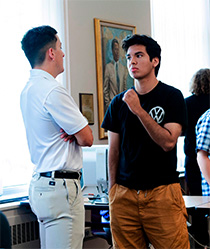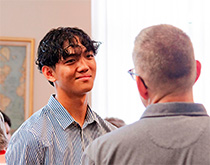One highlight of summer at Wabash is the WLAIP Listening Party, where participants in the Wabash Liberal Arts Immersion Program share audio essays they’ve produced in their own voice with the campus community. Not only is it a showcase for outstanding effort, but a culmination of a month of hard work, where these freshmen complete their first college credit in English composition and other informational sessions to aid in their transition to college.
Jill Lamberton, one of two English professors to teach the composition class, enjoys the event because of the trust that is on display. Trust built between student and professor allows for a certain level of vulnerability, especially as they are experiencing college for the first time.
“I do wonder if they’re willing to be vulnerable because we catch them at the moment of a major life transition, they don’t know anybody, and they’re forming new relationships,” she said. “These will be their lifelong friends at Wabash. They don’t know that yet, but some of these guys will say of their lifelong friends, ‘We met in the WLAIP.’ There’s something special about this moment of newness in transition.”
Presented below is a Q&A with members of the Class of ’28 and WLAIP participants Julio Cruz-Romero of McAllen, Texas; Nikolaz Cordova of Las Vegas; Marco Antonio Garcia of Indianapolis; and Jonah Glaser of South Bend, Indiana.
Q: What have you enjoyed most about the initial WLAIP experience this summer?
JCR: The thing I most enjoyed about this program was the relationships I formed with the professors and the  students around me.
students around me.
JG: The community of Wabash. Everyone is very close, and it’s something I didn’t experience in high school. Everyone got really close, really quickly.
MAG: Outside of class, I enjoyed socializing with my peers, pretty much just hanging out. We made lots of memories in this program, and I’m kind of sad that this part of the program is ending. It flew by way too fast and I’m really going to miss this.
Q: Obviously, you all have accomplished a lot in a short period of time. How much different do you feel now about yourself as a student than you did a month ago?
JCR: I’m very different now because I’ve been exposed to college, experienced discussions, which eventually will help me a lot in preparing for college itself. Having this experience will be a lot of help, especially for someone like me coming from a background that doesn’t have parents or other family members who have gone to college. It does help a lot when you are exposed to college.
JG: I feel more prepared than I did before. A lot of the anxieties that I had about college have mostly gone away after this experience and I definitely think this has helped me to be more prepared.
Q: Could you have done that essay a month ago?
JCR: Honestly, I didn't have the tools to make an audio essay because I am aware of my language and my accent. Coming from a Mexican-American background, this program has really helped me to understand, to become more conscious of my circumstances, and to emphasize it, to embrace it, which helped a lot with my essay, because I focused more on my family.
NC: I learned a lot in such a short time. After this month, having the professors, the tutors, the men, and mentors, all help me think critically and be disciplined toward the work. Day-by-day, working hard, having discussions in class, taught me a lot and now I’m confident when it comes to writing or talking to someone. I’m feeling great.
Q: How much more confident do you feel in the idea that you are a college student and you belong here?
JCR: Compared to one month ago, I am quite more confident. I came into this program knowing that I have to work to be at the level of other students. I really liked Dr. (Julian) Whitney’s class. He was aware of my circumstances, aware of other students’ circumstances and backgrounds. That really helped because you could relate to the readings we had. A student from my background, coming for a new educational journey, was just like the experience we read about. That really made me more confident in a college environment because I can take the experience and knowledge gained in this program, bring it home, and give it to my siblings or cousins so they can make their own decisions about pursuing their education. I’ll probably help them a lot because of this program.
MAG: I know that I have a place here. I like the professors, my peers, and my tutors. They care about me. They were always critical, but in a good way, when I did my essays because the feedback showed that I do belong and they really want me to do better.
Q: How nice is it to already have 30 friends on campus?
MAG: That’s also important. We have a bunch of guys from out of state—Texas, Arizona, Nevada—so having a group of friends that are supportive feels like a brotherhood. Wabash is a brotherhood, you’re not going to feel alone. You have a group of friends that are here supporting you along the way.
 NC: I think the best part is having a connection with everyone. Building those connections is a really good thing starting off my freshman year in college. When I come back in the fall, I’m going to have someone to lean on and ask for help.
NC: I think the best part is having a connection with everyone. Building those connections is a really good thing starting off my freshman year in college. When I come back in the fall, I’m going to have someone to lean on and ask for help.
Q; What’s the biggest, most important thing you’ve learned?
JCR: This is the farthest distance I’ve been from my family. This is the first time out of the state, out of my city, and this distance has helped me to appreciate my family’s roots and values. This has helped me accept the challenges college has for someone like me.
MAG: The WLAIP really showed me that I have to step out of my comfort zone because it’s a whole new environment with a whole bunch of new people. Actually going to the professor and asking him for feedback, or asking the tutors, ‘Hey, can you read my essay and tell me if it’s good or not?’ I never expected to do that in this program.
JG: (laughs) Do the reading beforehand.